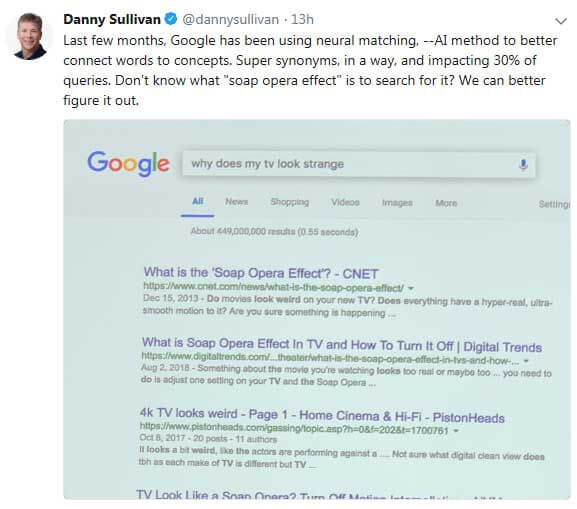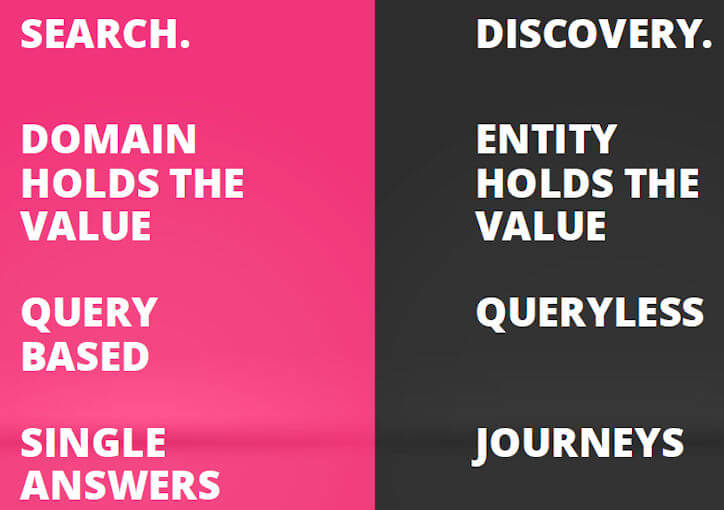Google is no longer just a search engine; it’s a discovery engine as well. The question for brands and sites today is: are you worth discovering?
In this episode of the popular Here’s Why digital marketing video series, Eric Enge explains what a discovery engine is and why SEOs should be optimizing not just for keywords but as useful, valuable entities as well.
Don’t miss a single episode of Here’s Why. Click the subscribe button below to be notified via email each time a new video is published.
Resources
- Solving Complex SEO Problems Requires a New Discovery Approach
- See all of our Here’s Why Videos | Subscribe to our YouTube Channel
Transcript
Mark: Eric, what do we mean by user discovery experience?
Eric: User discovery experience is about Google’s increasing shift for many queries from being a search engine to a discovery engine.
Mark: What’s the difference?
Eric: Traditionally a search engine provides the user with a large number of links to web pages that might satisfy the user’s query. A discovery engine is more about helping users to find or explore things that they may not have been explicitly searching for, but which have a good chance of being of interest to the user.
[Tweet “Google is becoming a discovery engine, helping people find content that might interest them before they search for it.”]
Mark: What are some examples of Google’s discovery engine at work?
Eric: As SEO Hannah Thorpe explained at SMX East, the most obvious example is Google’s own discovery feed on its mobile app, which displays articles and news items about topics Google thinks are of high interest to the user. We’re looking at an example of that feed right now.

But Google is also helping users with discovery in more subtle ways such as neural matching.
Mark: What is neural matching?
Eric: According to Google’s Danny Sullivan, neural matching is an AI method that attempts to connect words to concepts.
For example, as we see here, a user doesn’t know the name for a specific phenomenon.

He or she searches using a very human description like, “Why does my TV look strange?” Google’s AI neural matching knows that this fits with something called the “soap opera effect” and so displays results for that even though the phrase and the query may not actually appear on those pages.
Mark: It’s kind of like me saying, “Did you see that movie? Oh, you know, the one where a bunch of rebels are fighting against an evil galactic empire? What’s the name of it?”
Eric: Star Wars, Mark.
Mark: Nice neural matching there, Eric. Where else is Google helping with user discovery?
Eric: One fascinating area is Google’s interest in entities.
Mark: Entities?
Eric: Entities are identifiable things in the world. They could be people, places, organizations, or even concepts. Google is building an ever-expanding database of such entities. We see a direct display of entities in Google when it displays a knowledge panel directly in the search results, like the one we see here for Yorkshire Terrier.

Mark: Okay. Now let’s get practical with this. What should SEOs do as Google increasingly tries to create a user discovery experience?

Eric: First of all, don’t for a moment think that the traditional search methods are going away. Actually, as Hannah Thorpe explained, search and discovery each have their own unique value depending on the query and the user intent.
In discovery, the entity holds the value, while in search, the domain is the valuable thing. So discovery is not query-based; discovery is all about a journey–a user journey–while search is the quest for a single best answer.
Mark: Each has its value to the end user.
Eric: Exactly. As SEOs, we’re pretty experienced on the search side of things. We know to optimize for popular keywords that are relevant to your business, but we need to learn also how to optimize as entities to show up more on the discovery side of things.
Winning businesses in the future will be high performers in both search and discovery. So, while you need to keep working hard at ranking for your keywords, you also need to work to earn Google’s respect as a relevant, respected, authoritative brand entity that Google users will be glad to discover.
Don’t miss a single episode of Here’s Why. Click the subscribe button below to be notified via email each time a new video is published.
See all of our Here’s Why Videos | Subscribe to our YouTube Channel


I already see results affected by this “technology” is strange to see results focused in a synonym, but it will be better for the users and we have to improve our websites for the google updates.
It’s incredible the things AI is doing. It makes me wonder if there are ways to prepare my site ahead of time for it as he technology evolves.